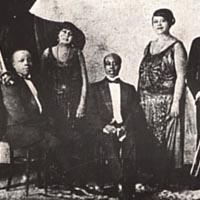Kansas City Blues
As in other rural areas, the blues in Missouri evolved from field hollers and work songs. To ease the drudgery of laboring in the fields, work bosses, echoing the call and response common to church services, called out a phrase and the workers responded in unison. ![]() Ma Rainey, a pioneering woman blues shouter, first heard the blues around 1902 while traveling with a tent show in eastern Missouri. After the show, a young woman cornered Rainey and sang a mournful song of lost love. Rainey incorporated the song into her repertoire and spread the blues across the country.
Ma Rainey, a pioneering woman blues shouter, first heard the blues around 1902 while traveling with a tent show in eastern Missouri. After the show, a young woman cornered Rainey and sang a mournful song of lost love. Rainey incorporated the song into her repertoire and spread the blues across the country.
Although not as well documented as the jazz tradition, blues flourished in Kansas City. Langston Hughes recalled, as a child, watching blues shouters preaching the blues on Independence Avenue while visiting Kansas City with his mother. Band leader Jesse Stone, who attended grade school in Kansas City, remembered venturing into the deep north end to watch guitarists sitting on front porches picking the blues, illuminated by lantern light. As a youth, ![]() Big Joe Turner, the "Boss of the Blues," accompanied blind blues shouters and sang with jug bands working the crowds flowing down 12th Street. The blues in Kansas City moved from the street corners and front porches into the cabarets lining 12th and 18th Streets, assuming a more sophisticated, urban style.
Big Joe Turner, the "Boss of the Blues," accompanied blind blues shouters and sang with jug bands working the crowds flowing down 12th Street. The blues in Kansas City moved from the street corners and front porches into the cabarets lining 12th and 18th Streets, assuming a more sophisticated, urban style.
Bennie Moten, George E. Lee, Paul Banks and other early band leaders incorporated the blues into their repertoire, creating an orchestral expression of the blues. The first recordings of Kansas City jazz featured the Moten band accompanying ![]() Ada Brown and Mary Bradford for the Okeh label. One of many so-called race labels, Okeh catered to African-American musical tastes ranging from spirituals to blues.
Ada Brown and Mary Bradford for the Okeh label. One of many so-called race labels, Okeh catered to African-American musical tastes ranging from spirituals to blues.
Ada Brown's ![]() Evil Mama Blues, recorded in September 1923, became the first in a long line of national hits by Kansas City artists. The feel and form of
Evil Mama Blues, recorded in September 1923, became the first in a long line of national hits by Kansas City artists. The feel and form of ![]() the blues shaped the development of Kansas City jazz from Bennie Moten to Charlie Parker.
the blues shaped the development of Kansas City jazz from Bennie Moten to Charlie Parker.


